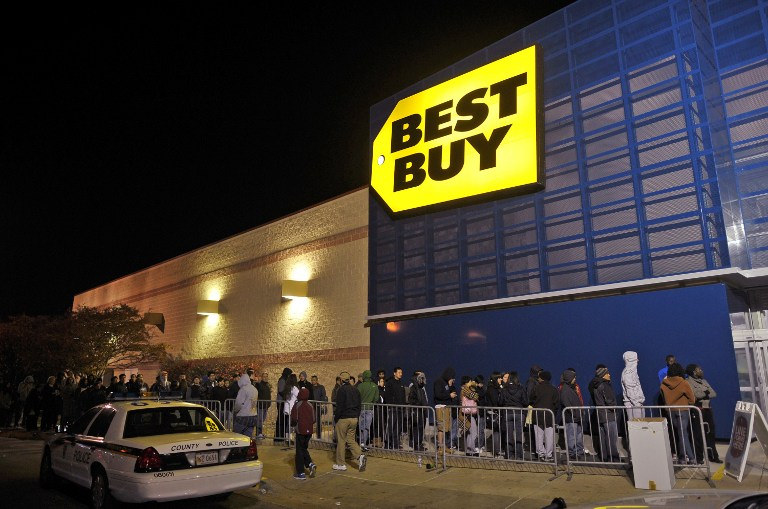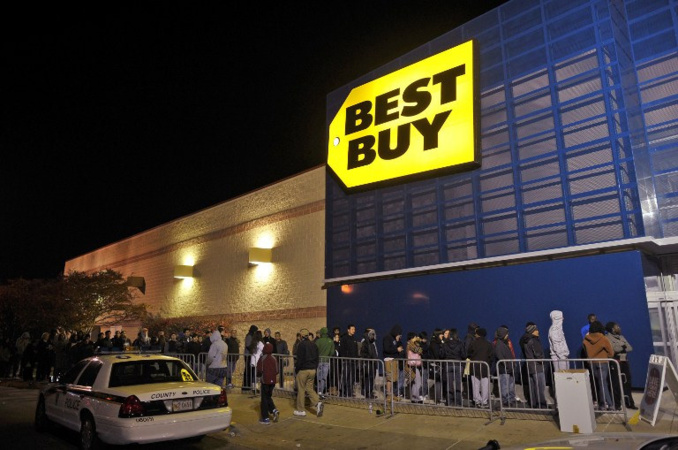According to the NRF, number of Americans who came to offline regular stores during "Black Friday 2016" was 99 million people, compared to 102 million in last year. Number of those, who swung to online shopping, has grown to 109 million from 103 million in 2016. This year. Thus, 2016 only confirmed a trend which outlined earlier: people do not want to push and shove each other out their way just to buy in retail stores. Now, they rather prefer to enjoy the same discounts on the Internet. This Black Friday, many buyers shopped in both online and offline stores.
The NRF’s says that number of active shoppers on Black Friday 2016 amounted to 154 million people, which is 3 million more than the year before. However, experts note that average purchase amount was smaller: $ 289.2 compared to $ 299.6 in 2015. "This weekend has become good for retailers, but even better it was for those consumers who have benefited from a number of really great discounts," - said President of the NRF Matthew Shay.
Experts in Europe are also noticing changes in consumer preferences. Thus, according to a poll of British Retail Economics, only 21% of respondents in the United Kingdom were planning to shop on Black Friday 2016 and the figure was 25% in the past year. 74% of those, who were going to visit in Black Friday sales, said that they were going to spend less than last year. "British consumers are growing tired of this event", - says Retail Economics’ Head Richard Lim (quoted by Bloomberg). There are no general preliminary results of Black Friday 2016 in the UK yet, but even now analysts expect repetition of the trends observed in the US. Shoppers are literally fleeing out to the Internet. According to research firm PCA Predict, this year the number of online purchases increased by 6.7% compared to the previous year, while number of visits to regular stores decreased by 6%.
Experts call the weekend after Thanksgiving Day the most important of the entire festive season sales. According to National Retail Federation, sales in November and December may rise by 3.6%, which is 3% higher than last year.
According to analysts, traditional leaders of Black Friday sales are household appliances and toys. Now, Wal-Mart, for one, is counting on growth in sales of other products, in particular, small UAVs. In turn, Head of Macy's chain of stores Terry Lundgren told the AP that sales of clothing, sports suits and dresses are going well enough. He expressed hope that the relatively cool weather will contribute to overall sales of winter items.
Nearly panicking retailers try to achieve sales growth with familiar schemes. Every major store is constantly trying to start selling off earlier than others, so every year the sales season is blurring. Some shoppers already consider that it’s easier to wait a few weeks and buy products and gifts with 30-40% discounts during the Christmas sale.
Such attitude is a real challenge for retailers. The shopping season, which covers November and December, is crucial to financial and operating results, as 40% of annual sales accounted for this period earlier.
source: bloomberg.com, ap.org
The NRF’s says that number of active shoppers on Black Friday 2016 amounted to 154 million people, which is 3 million more than the year before. However, experts note that average purchase amount was smaller: $ 289.2 compared to $ 299.6 in 2015. "This weekend has become good for retailers, but even better it was for those consumers who have benefited from a number of really great discounts," - said President of the NRF Matthew Shay.
Experts in Europe are also noticing changes in consumer preferences. Thus, according to a poll of British Retail Economics, only 21% of respondents in the United Kingdom were planning to shop on Black Friday 2016 and the figure was 25% in the past year. 74% of those, who were going to visit in Black Friday sales, said that they were going to spend less than last year. "British consumers are growing tired of this event", - says Retail Economics’ Head Richard Lim (quoted by Bloomberg). There are no general preliminary results of Black Friday 2016 in the UK yet, but even now analysts expect repetition of the trends observed in the US. Shoppers are literally fleeing out to the Internet. According to research firm PCA Predict, this year the number of online purchases increased by 6.7% compared to the previous year, while number of visits to regular stores decreased by 6%.
Experts call the weekend after Thanksgiving Day the most important of the entire festive season sales. According to National Retail Federation, sales in November and December may rise by 3.6%, which is 3% higher than last year.
According to analysts, traditional leaders of Black Friday sales are household appliances and toys. Now, Wal-Mart, for one, is counting on growth in sales of other products, in particular, small UAVs. In turn, Head of Macy's chain of stores Terry Lundgren told the AP that sales of clothing, sports suits and dresses are going well enough. He expressed hope that the relatively cool weather will contribute to overall sales of winter items.
Nearly panicking retailers try to achieve sales growth with familiar schemes. Every major store is constantly trying to start selling off earlier than others, so every year the sales season is blurring. Some shoppers already consider that it’s easier to wait a few weeks and buy products and gifts with 30-40% discounts during the Christmas sale.
Such attitude is a real challenge for retailers. The shopping season, which covers November and December, is crucial to financial and operating results, as 40% of annual sales accounted for this period earlier.
source: bloomberg.com, ap.org



















